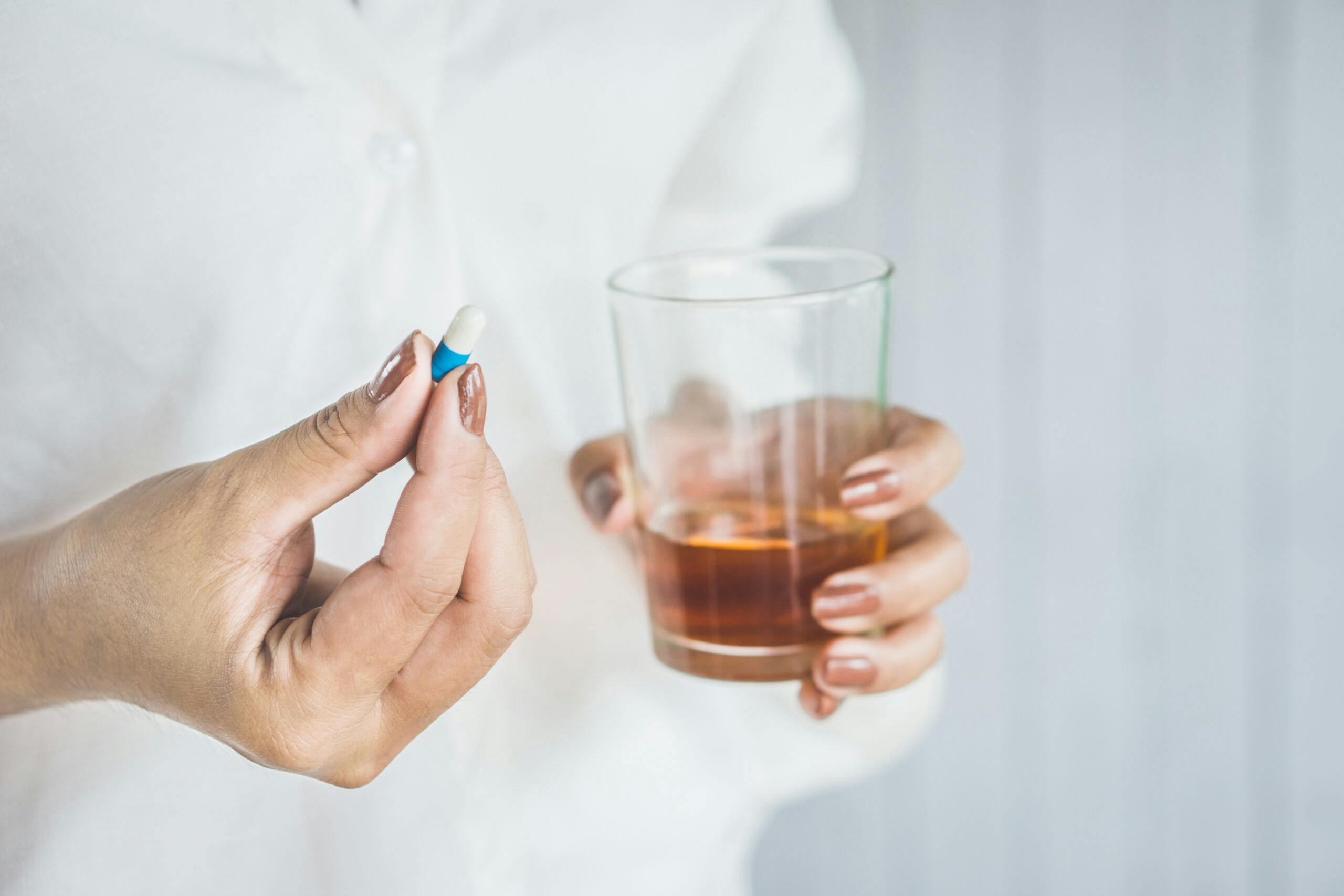If you take any kind of medicine, even over-the-counter (OTC), you should know that drinking alcohol could change the way that medication works in your body. It may be dangerous and even life-threatening to mix booze and medicine. The combination of medication and alcohol can lead to serious health consequences and negative medication interactions.
This may also include an increased risk of overdose and even death.
Here is what you need to know about the possible unsafe interactions between alcohol and common prescription and over-the-counter medications.

Dangers of Mixing Prescription Drugs with Alcohol
When mixing booze with prescribed drugs, it is possible to experience many different side effects, varying in intensity and danger.
Keep in mind that people experience things differently based on their pre-existing health conditions. What may be fine for you may cause serious harm to another.
Patients must only take prescription medications according to their doctor’s instructions.
For many prescriptions, that might mean that a patient will have to abstain from alcohol.
Abusing or misusing prescription medications can lead to addiction and dangerous side effects, including the risk of overdose.
Be sure to tell your doctor immediately if you have a history of alcohol abuse or drinking dependency.
It’s vital that these patients get help from a qualified addiction rehabilitation center.
Who Is Most At Risk When Mixing Prescription Drugs and Alcohol?
Current research on undergraduate students found that 12.1% of them misused prescription drugs and alcohol.
What’s more, 5% of current problem drinkers claim they’ve mixed both prescription and illegal drugs with alcohol, not including marijuana.
The risk factors for prescription drug and alcohol abuse include the following: (1)
- Being young, between the ages of 18 and 25.
- Not graduating from high school.
- Being single.
- Having a pattern of heavy drinking or binge drinking behaviors.
These Prescription Drugs Should Never Be Mixed with Alcohol
It’s important that patients openly and honestly talk to their doctor or healthcare provider about the names of the specific prescriptions they use.
Have a clear discussion with your doctor and ask whether their medicine will interact poorly with alcohol.
Millions of people who struggle with alcohol dependence and addiction may need specific types of prescription medications that help manage the process of detox. Speak to a doctor for advice.
However, it is always suggested to seek addiction treatment or alcohol use disorder counseling and therapy.
Continuing to drink while taking drugs for various health problems can worsen overall health due to harmful interactions and patients can risk dangerous side effects when mixing alcohol and prescription substances.
Prescription Medications to Avoid When Drinking Alcohol
- Flu, cold, and cough suppressant
- Allergy medications
- Tylenol
- Antibiotics
- Anti-anxiety and epilepsy medications
- Xanax
- Codeine
- Benzodiazepines (benzo addiction)
- Adderall
- Valium
- Angina medications
- ADHD medication
- Prescription sleep aids
- Narcotic pain medicines (containing opioids)
- Antidepressants
- Prescriptions for arthritis
- Cholesterol-lowering medications
- Blood thinners
- Painkillers
- Diabetes prescriptions
- Prescriptions for heartburn
- High blood pressure prescriptions
- Muscle relaxers
- Antipsychotic medications
- Stimulants (Ritalin)
- Oxycodone (avoid at all costs)
- acetaminophen
Side Effects of Mixing Prescription Drugs with Alcohol
Substance use, along with consuming alcohol, can have harsh side effects. Whether this happens purposefully or by mistake, overdose and bodily harm may occur.
People who are addicted to prescription drugs may also mix drugs and alcohol with the hope that they will get higher or experience an even greater feeling of sedation from their pain.
If you see someone who has accidentally ingested drugs or alcohol, it is crucial to call 911 right away.
Short-term and Long-term Side Effects
These are some common short-term and long-term side effects that may occur because of the mixture of booze and prescription drugs.
- Alcohol poisoning
- Ulcers
- Liver damage
- Anxiety and mental health issues
- Heart problems and heart attacks
- Internal bleeding
- Elevated heart rate or rapid heartbeat
- Loss of coordination
- Headaches
- Dizziness or fainting
- Sleepiness and drowsiness
- Impaired motor control
Tips for Preventing Alcohol and Medication Interactions
Even though there are medications that are safe to take with alcohol, it is crucial to follow a professional doctor’s, pharmacist’s, or healthcare physician’s instructions.
Read the information labels on the bottles or boxes of medication you are taking while drinking alcohol.
If you have a history of substance abuse or frequent use of prescription medication (such as strong painkillers or sedatives), it is essential to speak about it first. (2)
It is highly suggested that you avoid any alcohol consumption with a prescription medication until your doctor or pharmacist has told you that it’s safe to mix the two.
If you’re not sure if a medication can be combined with alcohol, refrain from using alcohol until you have received sound advice from your doctor
In Conclusion
If you, a loved one, or someone you care about is struggling with alcohol or prescription medication abuse, please reach out to a drug abuse counselor today to explore your treatment options.
There are support organizations, such as the National Institute on Alcohol Abuse and Alcoholism, to call when in need.
Phone number: 301–443–3860
Feel free to contact the Zinnia Health free alcohol addiction number at (855) 430-9439.
Citations
Related Articles
- Alcohol Use Disorder Treatment
- Mixing Alcohol and Antidepressants: A Dangerous Combination
- What is Dry Drunk Syndrome? Signs, Causes, and Prevention

